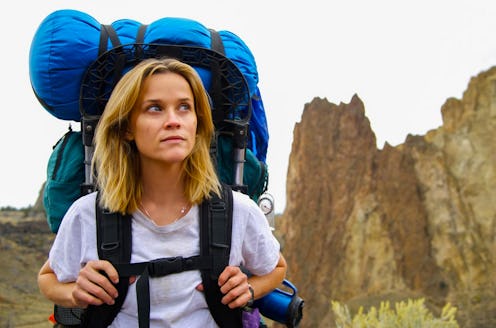Entertainment
The Power Of Adaptation Has Never Been Clearer

Watching a book you love come to life on the big screen can be a beautiful thing. But it's a beautiful thing at risk of tarnish; we've all seen a lackluster adaptation. But over the past couple of years, Gone Girl, The Hunger Games ' past two installments (Catching Fire and Mockingjay, Part 1) and 2014's Wild have begun to challenge our assumption that films will be lesser works of art than their source material. There is loss, inevitably — but there is also gain in the movement from page to screen. Gone Girl and Wild have been among the much-mourned snubs of the 2015 Oscar nominations, scoring Best Actress nominations for Rosamund Pike and Reese Witherspoon, but not for the adaptations of the stories these women channeled. The biggest snub in the Best Adapted Screenplay category is larger than Gillian Flynn or Cheryl Strayed and Nick Hornby alone: it's the snub of female stories, like Wild, that capture a story's soul, that transform it into something new, something fresh, and something entirely cinematic.
Supposedly that's what the Oscars are all about.
I finished reading Cheryl Strayed's Wild last week, having dragged it along with me over a month of not wanting to speed through a book that had immediately grabbed and taken residence somewhere deep inside me. It had burrowed into my gut, speaking to me in that way that brought reading to be such a sacred past-time in the first place. It meant a lot to me from the get-go, and so I was terrified to watch the movie. It follows, in a majority of cases, that if you loved a book it will be all the harder to love its movie.
One thing is guaranteed: A movie is always going to be different than its book. They are fundamentally different experiences, hardly comparable except in that they both feed us stories. It's like eating an orange versus drinking orange juice: The flavors are similar, but the very medium and experience is different. Orange juice can be watered down sludge or it can be fresh and reviving; an orange can be plump and full or it can be rotten or impenetrable. They are different, they are varied, and there is little use in evaluating them on the same rubric.
But Wild's movie, to my great joy, proved not to be a derivation of Strayed's beautiful memoir, but a journey through its most film-able, expressible parts. It could not capture everything, of course — part of the book entails feeling as if you are walking with Strayed through her tedious, painful, repetitive journey along the Pacific Coast Trail. But the Jean-Marc Vallée-directed, Nick Hornby-adapted film version of this same journey gives us new access not afforded in the book: We see the vicious realities of Cheryl Strayed's filleted feet, we see the monotony of the trail, we see the rubbed-raw flesh where her pack meets her body. We see the Bridge of the Gods as she reaches the end of her long, painful walk. On screen, Wild takes on a physical life, brought into further vivid reality by the mind-blowing sound mixing that brings Strayed's story racing through the ears. The mind's eye is crucial in the devouring of a book, but there is something special in seeing things with the literal eye, as well.
One of the essentials of Wild is the alone-ness of it: Most of it is just Cheryl Strayed, alone with her mind and the PCT. The memoir offers flashbacks, and the film does, too, with the latter utilizing sound mixing in perhaps the best example I've ever seen of expressing the running of the mind through sound and sight — the ease and the chaos of moments mixing of memory, of songs and sounds overlaying, retreating, and intruding, of current life mixing with history. That Wild's only nominations were in the acting categories is a crying shame not only for women's stories in film, but for film in general. Strayed's story is one that deserves recognition not only in its original form as a memoir, but in its adaptation as a film.
Wild cut and rearranged favorite passages and scenes, but it holds at its center a fluency in what Strayed was saying to herself and about the nature of her journey. "What if I never was redeemed? What if I already was?"
I no longer believe that there is any inherent lacking in the re-molding of a story from page to screen. There is transformation, of course, but there can be a special kind of power in that alteration. It's a process that, at its best, can make evident the beauty of both mediums. I never exactly expected Mockingjay to score an Oscar nomination, but the more I think about the Wild shut-out, the more I think about how we tell our stories and which stories we choose to celebrate. The Oscars this year are tragically lacking, from Selma director Ava Duvernay's snub in the Best Director category to the blindingly white actor's categories, but in both the Oscars and beyond, there is an overhaul that has been long necessary. This extends far past our entertainment, of course, and far past Best Adapted Screenplay.
But one thing is clear to me as I look at the films I've most readily devoured over the past couple of years: Alongside the more hefty issues, we could use a revamping of how we think of adaptations. Because I have rarely felt as grateful to the power of story as I have when watching a good one.
Image: Fox Searchlight Pictures; Indie-Cinema/Tumblr, Tawdrysquid/Tumblr, Hey-katniss-shoot-straight/Tumblr